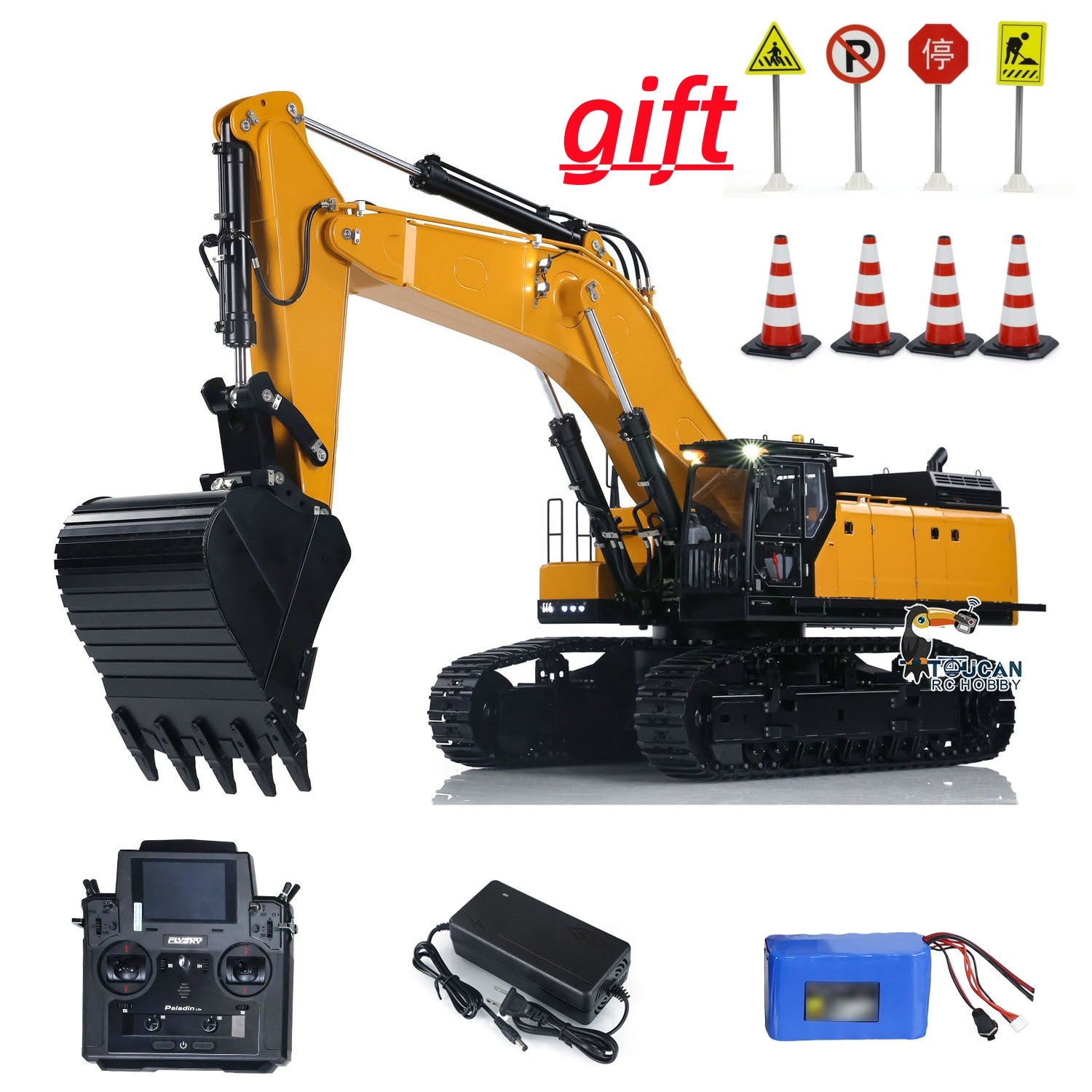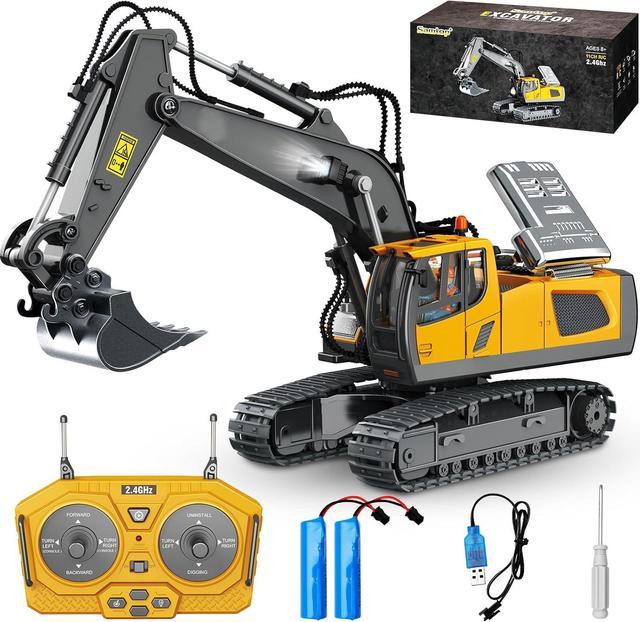Discover the Relevance of Excavator in Modern Building And Construction Projects
Excavators are necessary tools in contemporary building projects. Their versatility permits them to do a variety of tasks, from excavating and grading to demolition and site preparation. Advanced attributes, such as hydraulic add-ons and general practitioners, improve their capacities and efficiency on work sites. As the industry advances, the significance of excavators grows much more. Comprehending their duty can disclose understandings right into the future of construction methods. What exists in advance for these makers?
The Adaptability of Excavators in Numerous Projects
Although excavators are commonly related to massive construction tasks, their versatility allows them to be used in a broad variety of applications, from domestic landscape design to utility upkeep. In city settings, excavators can browse limited spaces to dig foundations for homes or install drain systems. Their ability to carry out delicate tasks makes them suitable for landscape design jobs, where they can dig deep into for fish ponds or plant trees. Additionally, excavators play an essential duty in utility upkeep, successfully digging trenches for pipes or cords without interfering with bordering areas. In agricultural applications, they assist in land cleaning and soil preparation. In addition, their adaptability allows them to be outfitted with different add-ons, enhancing their functionality across different tasks. This diverse nature of excavators not only improves different building processes yet also shows their important function in contemporary framework advancement and upkeep.
Key Functions and Types of Excavators
The discussion on crucial functions and kinds of excavators highlights the essential characteristics that make these equipments important in building. Numerous excavator types, each developed for certain tasks, show their adaptability and effectiveness across various applications. rc excavator. Understanding these classifications and attributes is vital for maximizing their use in modern-day construction jobs
Excavator Types Summary
Excavators play a critical function in contemporary building, providing adaptability and effectiveness throughout different jobs. These heavy equipment units come in several types, each tailored for specific applications. The most typical kinds consist of crawler excavators, understood for their security on irregular terrain, and rolled excavators, which supply higher wheelchair on paved surfaces. Small excavators are favored for limited rooms and small-scale jobs, while long-reach excavators are designed for deep excavating. In addition, there are specialized excavators, such as hydraulic excavators, which enhance power and accuracy. Each kind includes special abilities, making them essential for jobs ranging from excavating and grading to demolition and product handling. Comprehending these variants allows building specialists to pick the right excavator for their task requires.
Secret Includes Explained
Understanding the crucial features of excavators boosts their efficient application in construction jobs. Excavators are identified by their effective hydraulic systems, which provide the necessary pressure for excavating, lifting, and moving materials. Their expressed arms permit a large range of activity, helping with specific procedures in constrained rooms. Furthermore, the selection of accessories, such as pails, grapples, and augers, increases their convenience to fulfill various job needs. The dimension and weight of excavators also add to their security and maneuverability on different surfaces. Furthermore, improvements in innovation have actually led to the assimilation of GPS and automation, enhancing accuracy and effectiveness in excavation jobs. These features collectively place excavators as essential devices in modern construction.
Applications in Construction
Changing construction sites, excavators play a pivotal duty across various applications, varying from domestic structure projects to large framework advancements. These versatile makers are equipped for tasks such as digging structures, trenching for energies, and site grading. Various sorts of excavators, consisting of crawler, rolled, and mini excavators, provide specific benefits customized to the project demands. Spider excavators succeed in harsh surfaces, while rolled excavators use movement on paved surface areas. Miniature excavators are perfect for confined rooms, making them prominent in urban settings. The performance and power of excavators substantially accelerate building and construction processes, guaranteeing timely project completion. Their flexibility even more boosts their importance, allowing building and construction teams to take on a diverse range of difficulties efficiently.
Enhancing Efficiency and Efficiency on Task Sites
Making the most of efficiency and performance on task websites is an important purpose in modern building. Excavators play a crucial function in achieving this objective by simplifying various tasks. Their ability to perform multiple features-- such as digging, grading, and training-- decreases the need for added devices, therefore saving time and resources.Moreover, excavators boost workflow by enabling faster completion of tasks. With innovative functions like hydraulic add-ons and general practitioners innovation, they can execute exact procedures that minimize mistakes and rework. This precision not only boosts the top quality of job but also optimizes material usage, adding to cost savings.The convenience of excavators enables them to adjust to various website conditions, ensuring that projects progress smoothly no matter difficulties. By incorporating excavators into construction procedures, teams can substantially improve their total efficiency, causing timely project completion and raised success.
Safety And Security Advantages of Using Excavators
Excavators substantially enhance security on construction websites with boosted operator presence and minimized manual labor dangers. By providing operators with a clear sight of their environments, excavators aid to prevent mishaps and injuries. Additionally, the machinery minimizes the demand for workers to participate in harmful hand-operated jobs, even more advertising a much safer job setting.
Boosted Operator Presence
Building and construction sites can be disorderly and filled with prospective risks, boosted driver exposure plays a necessary role in guaranteeing safety and security when using excavators. Modern excavators are made with big, unhampered home windows and tactically placed mirrors, allowing operators to keep a clear view of their surroundings (rc excavator). This enhanced presence is critical for identifying pedestrians, various other equipment, and numerous barriers, substantially decreasing the danger of accidents. In addition, lots of excavators include sophisticated technology, such as cams and sensing units, to give drivers with added point of views, better improving awareness. The capacity to see more clearly not just aids in effective procedure but additionally fosters a safer job setting, making it simpler for operators to navigate complicated building and construction sites without endangering safety and security standards
Decreased Manual Labor Threats
When manual work is lowered with the use of excavators, countless safety benefits emerge, substantially boosting the health of building and construction this contact form workers. Excavators lessen the physical stress connected with hefty lifting and recurring tasks, properly lowering the danger of bone and joint injuries. By automating procedures such as digging, grading, and relocating products, they permit employees to preserve a much safer range from prospective hazards. Furthermore, excavators are geared up with innovative safety and security attributes, such as rollover protection systems and enhanced driver functional designs, which further protect employees on site. The result is a substantial reduction in work environment accidents and injuries, bring about raised efficiency and morale amongst building and construction teams. Inevitably, the adoption of excavators contributes to a much safer and more reliable building and construction atmosphere.
Excavators in Earthmoving and Site Prep Work
In modern-day building, a considerable section of earthmoving and website prep work tasks counts on the performance and convenience of excavators. These equipments are designed to take care of numerous soil types and surface, making them indispensable for grading, excavating, and trenching tasks. Their hydraulic arms can be geared up with various attachments, such as augers and containers, allowing drivers to customize their approach based on specific job requirements.Excavators excel at moving huge quantities of planet swiftly and successfully, which increases the total construction timeline. They can navigate tight spaces and testing websites where conventional equipment may have a hard time, boosting productivity. Additionally, the accuracy of excavators guarantees that website preparation follows rigorous specs, decreasing the risk of errors that might result in pricey rework.
The Role of Excavators in Demolition Tasks
Excavators play a their explanation necessary role in demolition jobs, as they have the power and agility required to take apart frameworks effectively. Equipped with different attachments such as hydraulic breakers, shears, and grapples, these equipments can adapt to different demolition requirements, whether for little structures or huge commercial sites. Their convenience makes it possible for operators to tackle intricate projects while keeping safety and security and precision.In addition to their demolition abilities, excavators assist in debris removal, ensuring that work websites stay well organized and risk-free. By breaking down frameworks into manageable pieces, they permit for streamlined cleaning and recycling of materials, lining up with modern sustainability efforts.Moreover, excavators can access tight spaces and navigate unequal surface, making them indispensable in metropolitan demolition projects. Generally, their robust design and multifunctionality make excavators an essential property in the demolition stage of building, adding significantly to job timelines and efficiency.


Future Trends in Excavator Modern Technology and Usage
As the building and construction sector progresses, developments in excavator technology are positioned to change their usage and effectiveness substantially. One substantial pattern is the integration of automation and fabricated intelligence, enabling excavators to run with marginal human intervention. This shift will boost precision in tasks such as grading and trenching, lowering human error and boosting productivity.Additionally, the rise of hybrid and electrical excavators is shaping an extra lasting building atmosphere, lowering carbon emissions and fuel prices. Enhanced telematics systems are likewise emerging, allowing real-time monitoring of maker performance and maintenance needs, which can cause far better functional effectiveness and longer devices lifespan.Moreover, advancements in attachment technology are expanding the adaptability of excavators, allowing them to do a broader variety of tasks. The combination of these patterns shows a future where excavators are smarter, greener, and a lot more versatile, ultimately reshaping building project characteristics.
Often Asked Inquiries
Exactly How Do Excavators Compare to Other Building Machinery?
Excavators, characterized by their convenience and power, succeed in digging and earthmoving contrasted to various other machinery. Their capability to perform various tasks, consisting of training and demolition, makes them indispensable in construction projects, improving total effectiveness.

What Is the Average Life Expectancy of an Excavator?
The average life expectancy of an excavator generally ranges from 7,000 to 10,000 operating hours, relying on maintenance, usage conditions, and design. Proper care can prolong this lifespan, making certain peak performance throughout its operational years.
How Are Excavators Preserved for Ideal Efficiency?
Excavators require normal upkeep for peak performance, consisting of regular inspections, liquid checks, filter substitutes, and prompt repairs. Implementing a preventative maintenance schedule helps prolong their life-span and warranties efficient operation in numerous construction settings.
What Are the Costs Connected With Acquiring an excavator vs. renting out?
The costs connected with acquiring an excavator versus renting out vary substantially. Renting deals reduced upfront expenditures yet can gather with time, while acquiring calls for a considerable preliminary financial investment, but supplies lasting financial savings and property possession benefits.
What Training Is Required to Run an Excavator?
Running an excavator requires specialized training, normally including security procedures, device procedure techniques, and environmental recognition. Certification programs commonly mandate practical experience, making it possible for drivers to take care of numerous jobs efficiently while making sure conformity with industry policies. The most common kinds include spider excavators, understood for their stability on irregular terrain, and wheeled excavators, which provide higher flexibility on paved surface areas. Small excavators are preferred official source for tight rooms and small-scale jobs, while long-reach excavators are designed for deep digging. Additionally, there are specific excavators, such as hydraulic excavators, which improve power and accuracy. Various kinds of excavators, including spider, rolled, and mini excavators, provide details benefits customized to the job requirements. Crawler excavators succeed in rough surfaces, while rolled excavators provide mobility on paved surfaces.